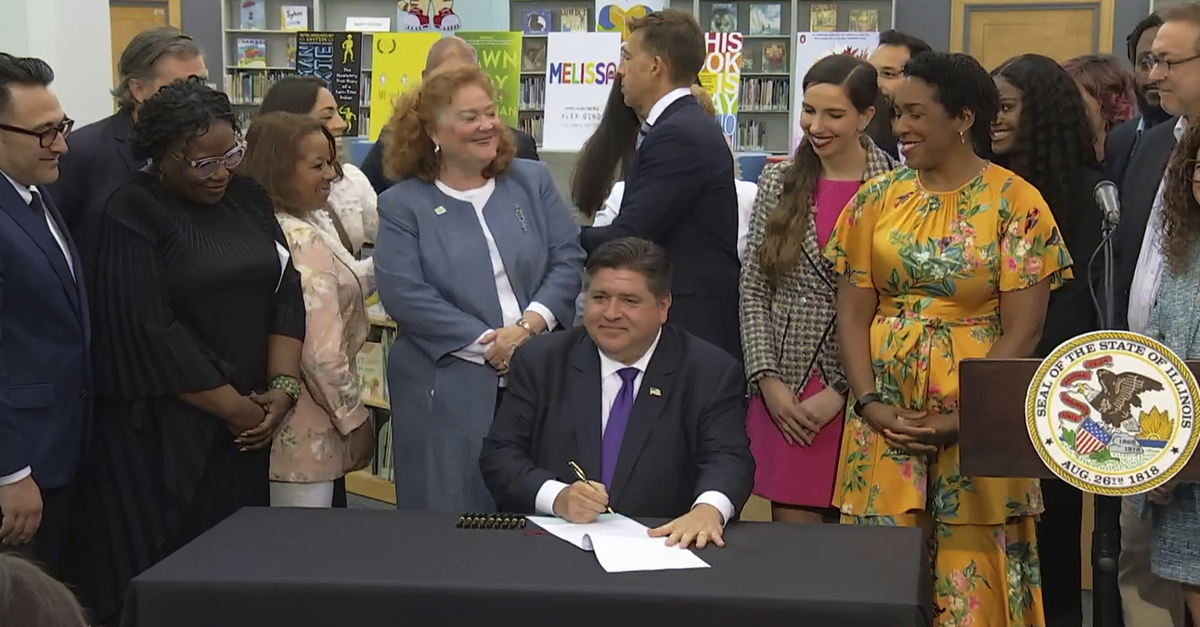
In this screenshot from a livestream, Illinois Gov. J.B. Pritzker signs a bill, Monday, June 12, 2023, at Harold Washington Library's Thomas Hughes Children's Library in downtown Chicago. The new law, effective Jan. 1, 2024, requires the state's libraries to uphold a pledge not to ban material because of partisan disapproval. Pritzker said the law will make Illinois the first state in the nation to outlaw book bans. (State of Illinois via AP)
"Regimes ban books, not democracies."
Those were the words from Illinois Gov. JB Pritzker (D), who signed what he hailed as the nation's first state law to outlaw the practice of banning books from public libraries.
Pritzker signed HB2789 into law on Monday.
The legislation appears to be a direct response to the recent wave of attacks on books — largely those that tell stories relating to race, gender, and sexuality — targeting public and school libraries nationwide. It specifically aims to "encourage and protect the freedom of libraries and library systems to acquire materials without external limitation and to be protected against attempts to ban, remove, or otherwise restrict access to books or other materials."
The law, which will take effect Jan. 1, 2024, not only mandates that free library services be expanded such that libraries are provided for all citizens of Illinois, but also specifies that these libraries must have "adequate library materials to satisfy the reference and research needs of the people of this state" as well as "adequate staff of professionally trained librarians" on hand.
The new law explicitly requires that any state-funded library either adopt the American Library Association's (ALA) Library Bill of Rights, which prohibits censorship based on "partisan or doctrinal disapproval," or work with the state librarian to develop its own written statement committing to keeping the book supply adequate.
Most notably, the law includes an outright prohibition on the practice of banning specific books or resources.
According to the ALA, there were 43 attempts to ban books in Illinois in 2022 and 1,477 book bans nationwide affecting 874 individual titles during just the first half of the 2022-23 school year — a 38% increase over the prior year. Many of the books banned are stories by and about racial minorities and the LGBTQ+ community.
The most-challenged title in 2022 was "Gender Queer: A Memoir" by Maia Kobabe, an award-winning graphic novel that explores nonbinary and asexual gender identities.
Terry Newsome, a parent who advocated for the banning of "Gender Queer," insisted that efforts to ban books are aimed at prohibiting access to books he deemed "pornographic."
"They call us book banners, but we're not banning books," Newsome said. "We want to ban pornographic books. Heterosexual or homosexual, it doesn't belong in the school."
Alexi Giannoulias, the Illinois Secretary of State who also serves as state librarian, disagreed.
"Parents, and only parents, have the right and responsibility to restrict their children and only their children's access to library resources," said Giannoulias.
"Here in Illinois, we don't hide from the truth, we embrace it," Pritzker said in a statement Monday. "Young people shouldn't be kept from learning about the realities of our world; I want them to become critical thinkers, exposed to ideas that they disagree with, proud of what our nation has overcome, and thoughtful about what comes next. Everyone deserves to see themselves reflected in the books they read, the art they see, the history they learn. In Illinois, we are showing the nation what it really looks like to stand up for liberty."
In the statement, Giannoulias said that the legislation comes at a "perilous" time in American democracy.
"The concept of banning books contradicts the very essence of what our country stands for," Giannoulias said. "It also defies what education is all about: teaching our children to think for themselves. This landmark legislation is a triumph for our democracy, a win for First Amendment Rights, and a great victory for future generations."
Dan Montgomery, the president of Illinois Federation of Teachers (IFT), commended those who supported the legislation.
"At a time when some other states are fanning the flames of racism and anti-LGBTQ+ fear, we're proud that Illinois has once again taken a stand for what is right," Montgomery said.
Democratic State Senator Laura Murphy called public libraries "the heart of a community" and said protecting the rights of readers to be exposed to diverse experiences through books is of critical importance.
Book bans in public libraries, including school libraries, necessarily raise First Amendment issues, and the U.S. Supreme Court has yet to definitively settle the issue. A 1982 Supreme Court ruling found that a public school board's content-based book ban violated the First Amendment, but that plurality decision left the legalities of book bans unclear, at best.
In addition to signing this legislation, Pritzker has taken action over the past several months to continue fighting censorship in the classroom. In January, he sent a letter to the CEO of the College Board, demanding it reverse its controversial decision to remove crucial parts of the AP African American Studies curriculum after Florida Gov. Ron DeSantis (R) demanded the change.
Pritzker also backed a statewide partnership with Dolly Parton's Imagination Library, a book-gifting initiative that mails free, high-quality books to young children.
Editor's Note: This piece has been updated from its original version to correct a reference to Terry Newsome using the pronouns "she" and "her."
Comments